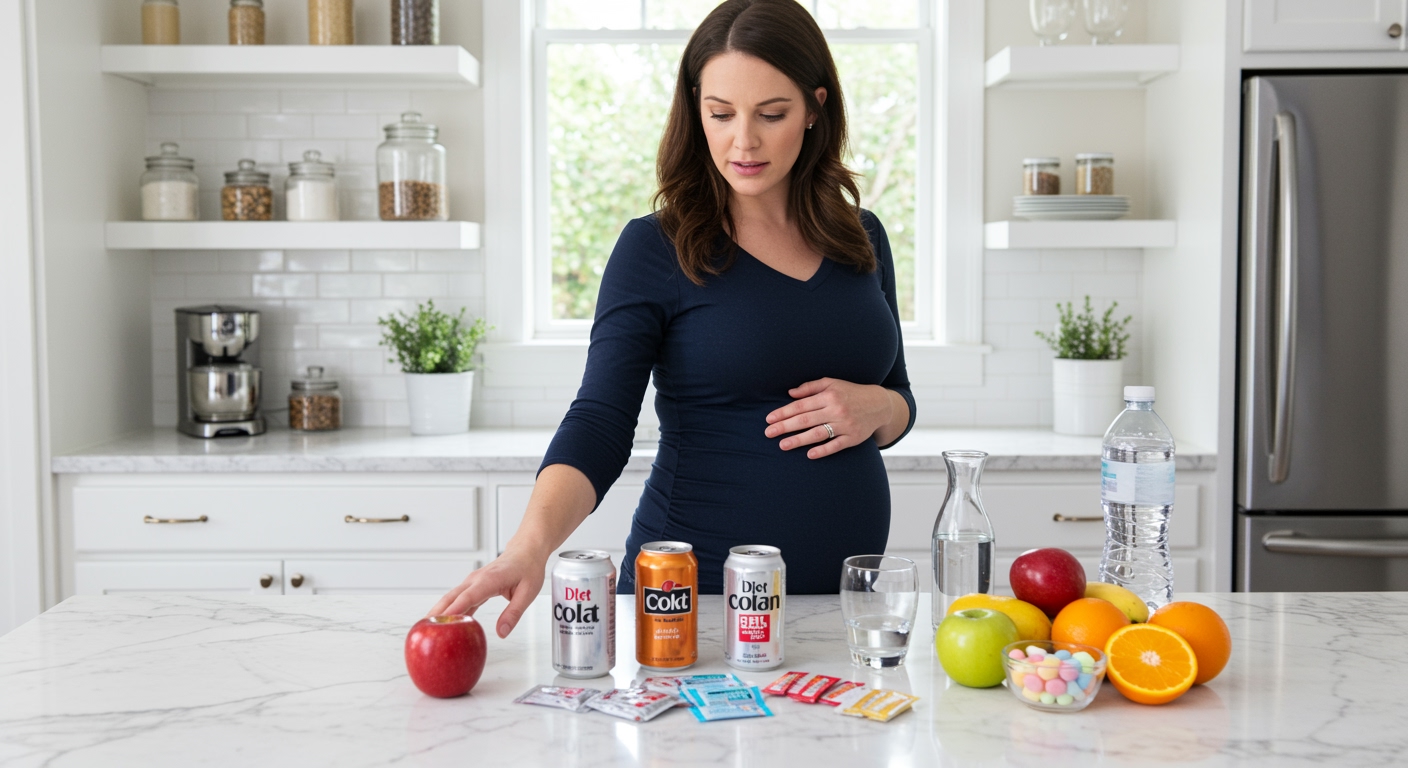✪ Key Highlight: Australian study of 3,600 women shows drinking 5+ diet drinks weekly during pregnancy increases gestational diabetes risk by 88%.
Introduction
Many pregnant women reach for diet sodas thinking they are making a healthier choice for their baby.
A shocking new study from the University of Adelaide reveals that artificially sweetened beverages during pregnancy may actually increase the risk of gestational diabetes by a staggering 88 percent.
Hi, I’m Abdur, your nutrition coach and today I’m going to analyze this groundbreaking research that challenges everything we thought we knew about diet drinks during pregnancy.
What Did This Major Study Discover?
Researchers followed over 3,600 women from the Australian Longitudinal Study on Women’s Health to understand how diet drinks affect pregnancy outcomes.
The study tracked women’s consumption of diet cola, sugar-free sodas, and artificially sweetened cordials both before and during pregnancy.
Women who consumed five or more artificially sweetened drinks per week during pregnancy showed an 88 percent higher risk of developing gestational diabetes.
Even more concerning, each additional diet drink increased the risk by 6 percent, creating a clear dose-response relationship.
The researchers used advanced statistical models to ensure their findings were accurate and accounted for other risk factors.
Lead author Bereket Gebremichael Menota explained that previous studies on low-calorie sweeteners during pregnancy had mixed results, prompting this comprehensive investigation.
✪ Fact: Gestational diabetes affects approximately 14 percent of pregnant women globally, making this research critically important.
Why Is Gestational Diabetes So Dangerous?
Gestational diabetes is a type of diabetes that develops during pregnancy when blood sugar levels become too high.
This condition occurs because pregnancy hormones make it harder for insulin to keep blood sugar levels normal.
When the body cannot produce enough insulin to overcome this resistance, blood sugar rises and gestational diabetes develops.
The condition creates serious risks for both mother and baby, including larger babies, increased risk of stillbirth, and delivery complications.
Women who develop gestational diabetes have a much higher chance of developing type 2 diabetes later in life.
The condition usually disappears after birth, but its effects can last a lifetime for both mother and child.
✪ Note: Babies born to mothers with gestational diabetes are also at higher risk of developing diabetes and obesity later in life.
What Other Factors Increase Gestational Diabetes Risk?
The study identified several other important risk factors that pregnant women should be aware of.
Being overweight or obese before pregnancy significantly increases the risk of developing gestational diabetes.
Having a family history of diabetes, especially type 2 diabetes, makes women more susceptible to this condition.
Age plays a crucial role, with women over 40 years old facing higher risks than younger mothers.
Certain ethnic backgrounds, including South Asian, Chinese, African-Caribbean, and Middle Eastern heritage, show increased susceptibility.
Physical inactivity and sedentary lifestyle before pregnancy contribute significantly to gestational diabetes development.
✪ Pro Tip: Regular physical activity before and during pregnancy can significantly reduce your risk of gestational diabetes.
How Do Artificial Sweeteners Affect Pregnancy?
The study did not prove that artificial sweeteners directly cause gestational diabetes, but the association is very strong.
Artificial sweeteners may disrupt the body’s ability to regulate blood sugar through various mechanisms.
These chemicals can alter gut bacteria, which plays a crucial role in metabolism and insulin sensitivity.
Some artificial sweeteners may trigger insulin responses even without raising blood sugar, confusing the body’s metabolic signals.
During pregnancy, hormonal changes already make blood sugar control more challenging, and artificial sweeteners may worsen this problem.
Associate Professor Zohra Lassi, a co-author, emphasized that artificially sweetened drinks may seem healthier but could have unintended consequences for expectant mothers.
✪ Note: More research is needed to understand the exact biological mechanisms behind this artificial sweetener-diabetes connection.
What Should Pregnant Women Drink Instead?
The safest choice during pregnancy is always plain water, which provides hydration without any risks.
Sparkling water with a splash of natural fruit juice can satisfy cravings for fizzy drinks without artificial additives.
Herbal teas like ginger or peppermint can provide flavor variety while offering potential health benefits during pregnancy.
Fresh fruit-infused water creates natural sweetness and flavor without any artificial chemicals.
Low-fat milk provides essential nutrients like calcium and protein that support both mother and baby’s health.
If you crave sweet drinks occasionally, small amounts of 100 percent fruit juice diluted with water can be a better option than diet sodas.
✪ Pro Tip: Aim for at least 8-10 glasses of water daily during pregnancy to support your increased blood volume and baby’s development.
The Bottom Line
This large, well-designed study provides compelling evidence that frequent consumption of artificially sweetened beverages during pregnancy significantly increases gestational diabetes risk.
When it comes to pregnancy, natural is always better than artificial, and your baby’s health is worth every sacrifice you make.
I would love to hear your thoughts on this research and any questions you might have about healthy beverage choices during pregnancy in the comment section below.
References
At NutritionCrown, we use quality and credible sources to ensure our content is accurate and trustworthy. Below are the sources referenced in writing this article:
- New Atlas: Artificially Sweetened Beverages Gestational Diabetes Risk
- HSE Ireland: Gestational Diabetes Conditions
- PubMed: Artificially Sweetened Beverage Consumption Study
- Mayo Clinic: Gestational Diabetes Symptoms Causes
- CDC: About Gestational Diabetes





